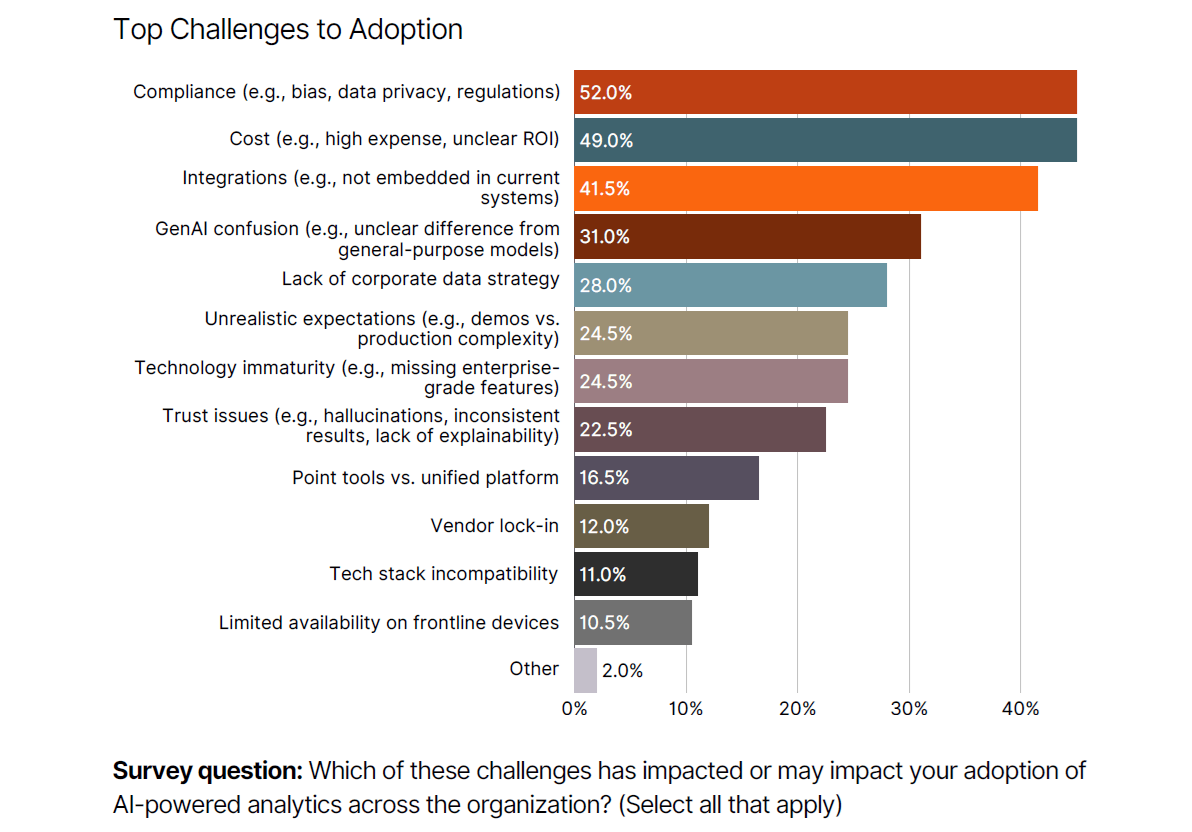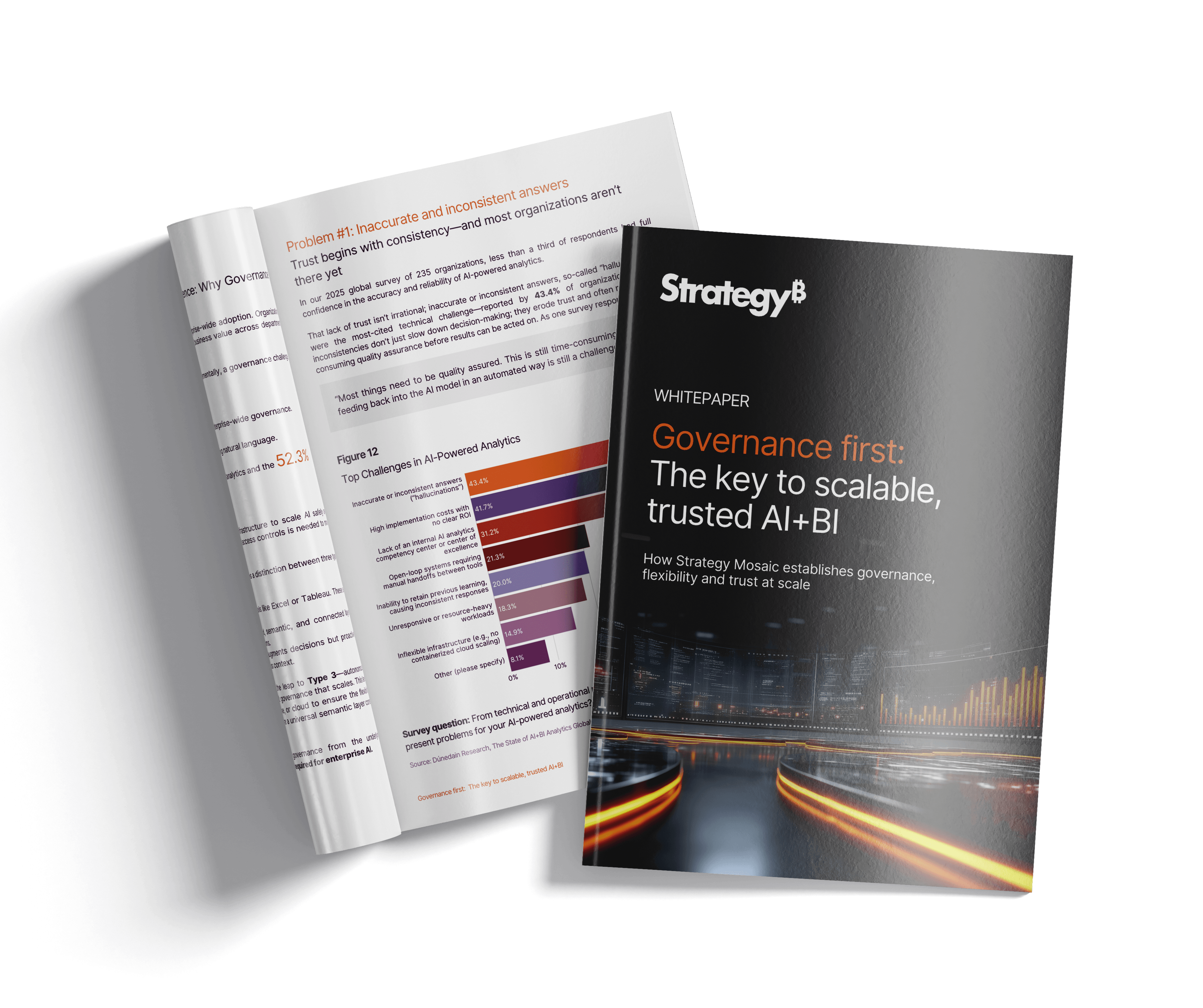How enterprises scale secure, governed AI with a universal semantic layer
Security and compliance remain the most cited barriers to enterprise AI adoption. See how leaders are integrating a universal semantic layer to tackle AI challenges—and explore how a governed data foundation is key to ensuring consistency across every tool, application, and platform.
According to Strategy's Governance First whitepaper, 52.0% of organizations identify compliance as the top challenge to scaling AI-powered analytics.

The term “compliance” covers issues related to:
Data privacy
Bias mitigation
Sector-specific regulation
In fact, non-compliance doesn’t just risk data breaches—it creates legal and financial consequences that cause long-term reputational damage.
For enterprises, the real challenge isn’t just meeting compliance requirements—it’s maintaining consistent control as AI adoption scales.
Why control fails: Too many sources, too little governance
As AI access expands beyond expert users, policies embedded in individual BI tools or clouds rarely carry across platforms. Each time a team adopts a new front-end tool or moves workloads between environments, it creates policy drift, gaps in enforcement, and adds operational overheads.
The result? An inconsistent, uncoordinated analytics stack that prevents secure access to data. Which is why governance must be centralized, not scattered.
“You can expose data to AI tools in a tightly controlled way—ensuring that the AI only sees the data it’s authorized to work with.”
— Saurabh Abhyankar, chief product officer, Strategy
An AI-ready control point: the universal semantic layer
A universal semantic layer acts as a central hub that connects all your data sources. Instead of having to understand the technical details of each database or system, it translates everything into standardized business terms.
Critically, a universal semantic layer shifts enforcement from siloed tools to a shared governance fabric. Policies are declared once and applied everywhere—across BI dashboards, AI agents, and custom applications. It delivers fine-grained controls such as:
Row-level filters (e.g., by region, business unit, or product line)
Column-level restrictions (e.g., salary or personal identifiers)
Feature-level permissions (e.g., explore, export, embed, or query with AI)
The universal semantic layer ensures security and semantic logic remain consistent across tools, databases, and clouds. Teams and systems see only what they are authorized to see, while users gain access to accurate, AI-ready insights—without IT bottlenecks.
The result? No more gaps during migrations or mergers, and a simpler, safer auditing and remediation process. An AI-ready semantic layer gives organizations the confidence to expand access without sacrificing control.
“One user might only be allowed to view data from a particular region, while another sees different segments. Our universal semantic layer, Strategy Mosaic, allows you to define very sophisticated security filters at every level.”
— Saurabh Abhyankar, chief product officer, Strategy.
Why is a governed data foundation critical to enterprise-wide AI adoption?
Explore the challenges that hold businesses back, and learn how a universal semantic layer enables teams to govern data with confidence.
Introducing Strategy’s universal semantic layer, Mosaic
Strategy Mosaic implements the universal semantic layer independently from tools, databases, and clouds. It decouples governance and security from underlying platforms, so one set of definitions and rules is enforced consistently across all contexts.
Row-, column-, and feature-level policies are centralized and automatically honored by downstream tools and AI interfaces.
This way, Strategy Mosaic ensures all metrics and KPIs are consistent for all teams within the tools and applications they use every day.
See how Strategy Mosaic delivers enterprise-grade governance for AI + BI
Without semantic consistency, definitions vary, trust erodes, and AI initiatives struggle to scale.
A universal semantic layer ensures accurate, governed, and consistent insights across all teams, applications, and tools.
Strategy Mosaic eliminates redundancy, prevents policy drift, and enables compliant self-service at scale. It allows organizations to enforce consistent security and compliance policies without needing to duplicate rules across platforms.

